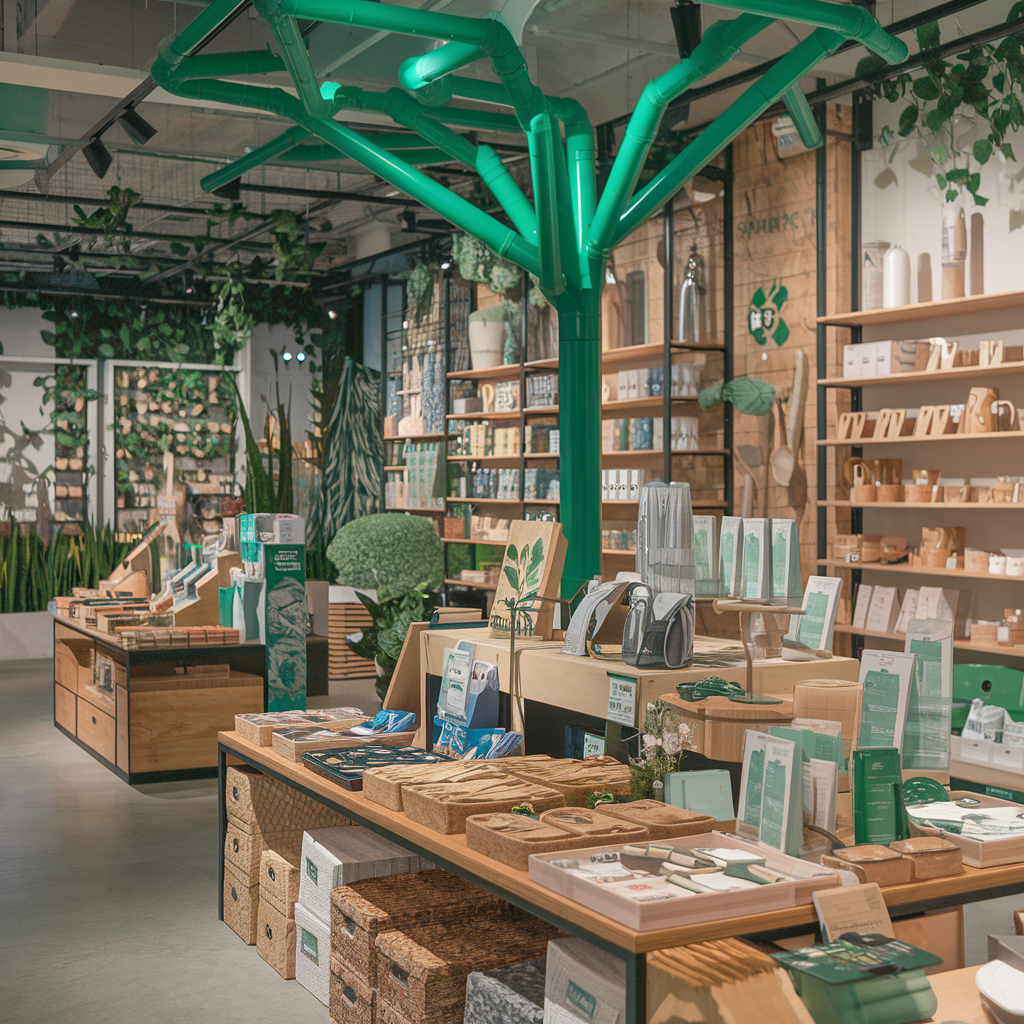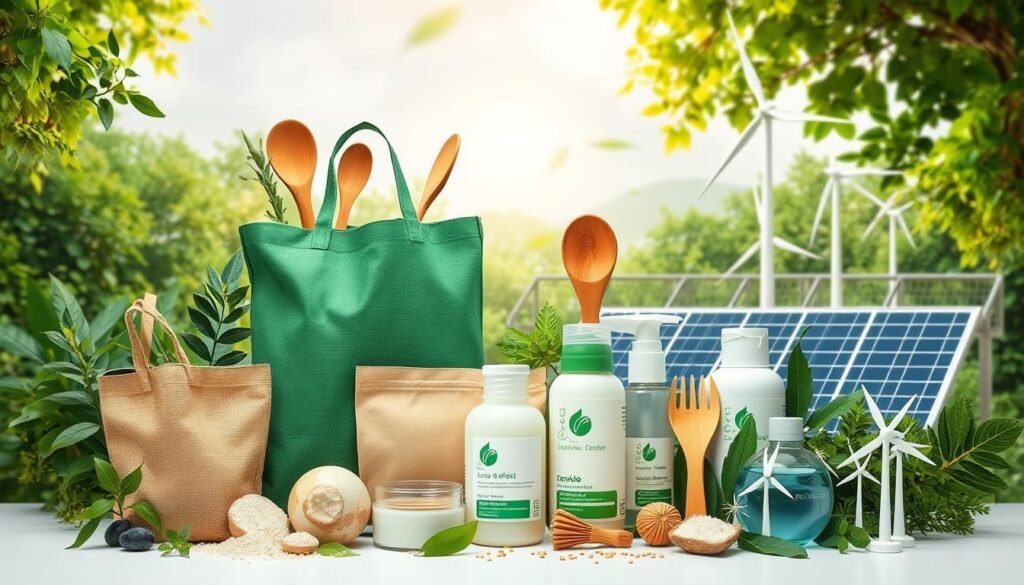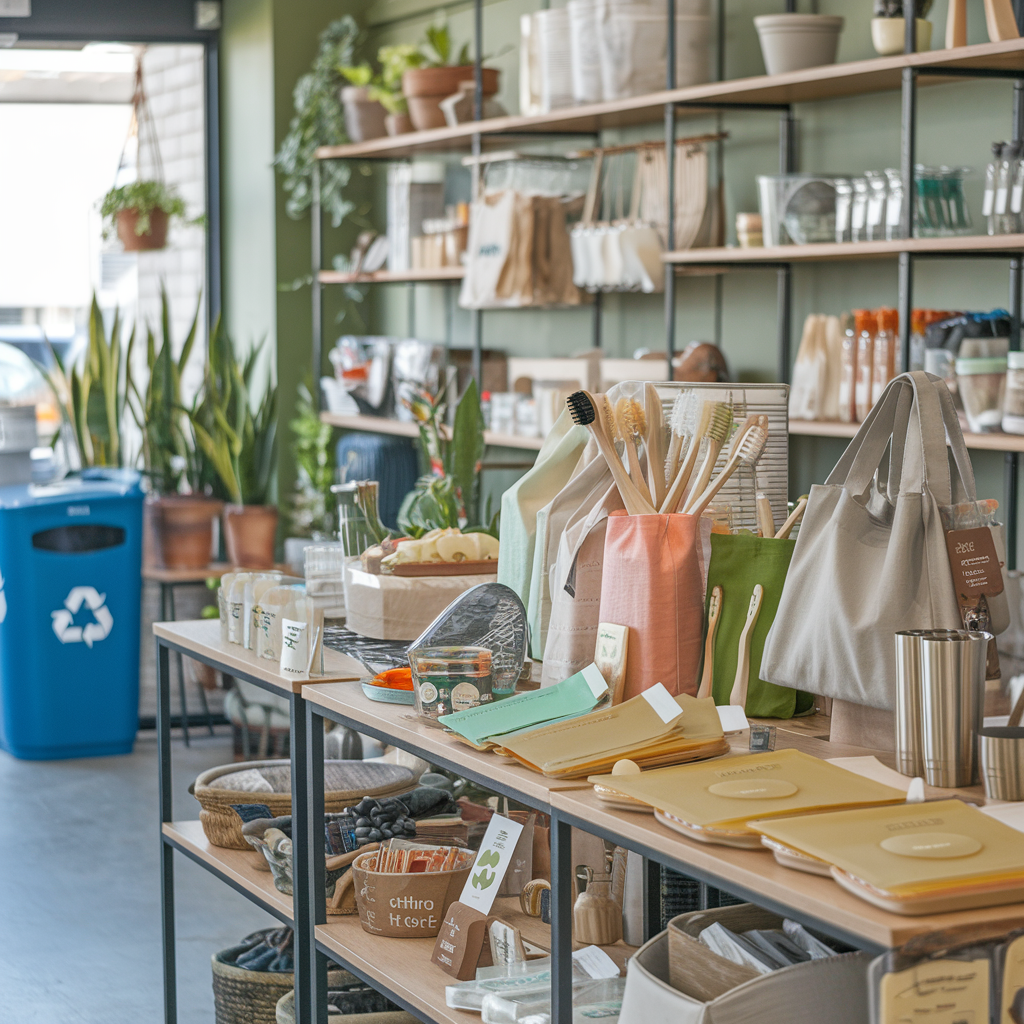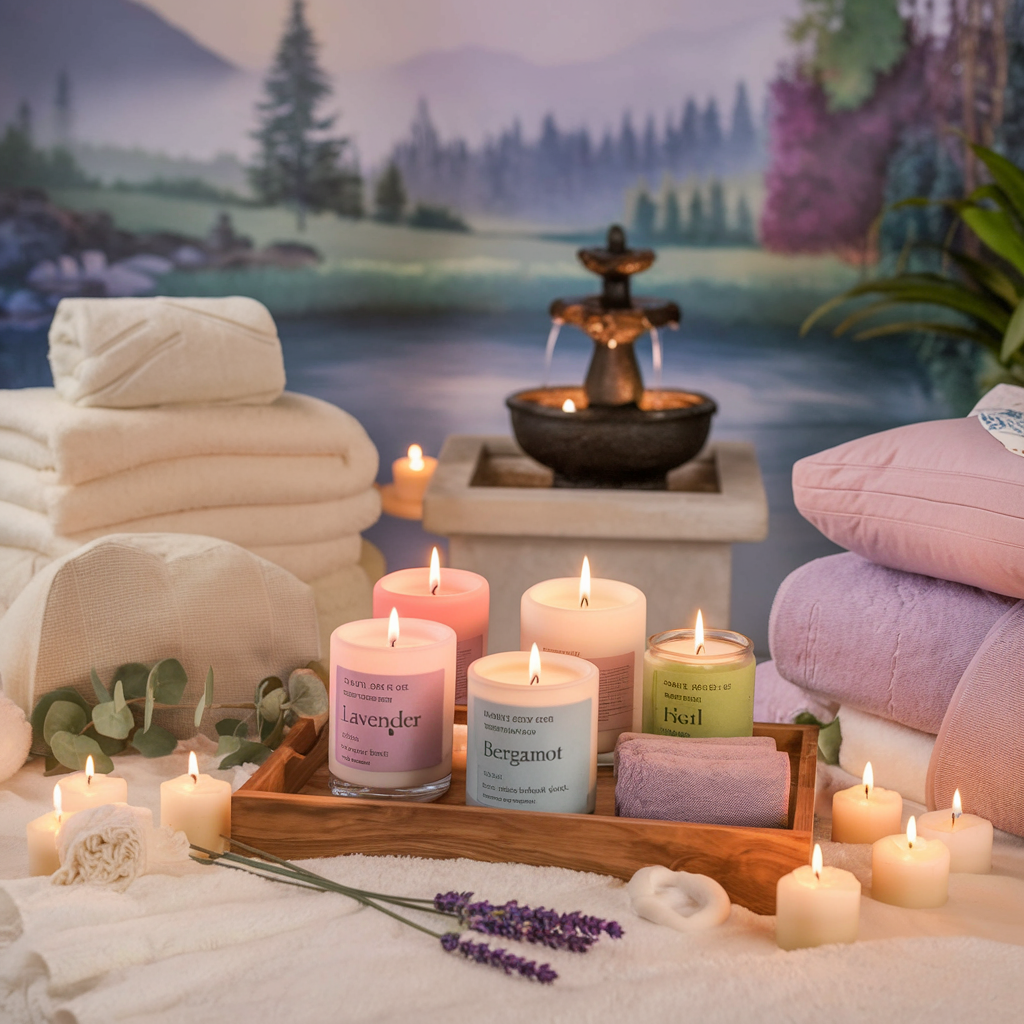In today’s world, more people care about the planet than ever before. A new wave of eco-friendly brands is leading the way to a greener future. They’re changing how we think about products and services, focusing on making things right and reducing waste.
These brands cover everything from clothes and beauty products to tech and home items. They’re making a real difference in our daily lives. They show us how to live, work, and play in a more sustainable way.
Behind this movement are people who want brands to care about the environment. Eco-friendly brands are stepping up, showing they’re serious about being green. They’re using clear supply chains, creative designs, and helping the planet and people.
By doing this, these brands are not just meeting today’s needs. They’re also helping create a greener tomorrow. They’re showing us all how to be more eco-friendly.
Key Takeaways
- Eco-friendly brands are at the forefront of sustainable innovation across diverse industries.
- Conscious consumerism is driving the rise of brands that prioritize environmental responsibility.
- Sustainable brands are embracing transparent supply chains, innovative materials, and waste reduction initiatives.
- These brands are shaping a new era of responsible consumption and environmental stewardship.
- The growing popularity of eco-friendly brands reflects the increasing demand for sustainable products and services.

Understanding the Rise of Sustainable Consumerism
The way we shop is changing, thanks to our growing concern for the planet. More people want to buy green products and support conscious consumerism. This shift is changing how businesses plan and what they focus on.
The Growth of Green Consumer Awareness
Today, shoppers know more about the environmental impact of what they buy. Media, education, and reliable data have helped raise awareness. This knowledge leads to better choices, like choosing eco-friendly options and supporting brands that share their values.
Impact of Environmental Consciousness on Buying Decisions
- People are ready to spend more on green products that are good for the planet.
- How a brand acts on sustainability matters a lot when making a purchase.
- Shoppers look for companies that work on reducing waste, using renewable energy, and making things ethically.
This change in how we shop is big news for businesses. It makes them rethink their plans and how they make products. The push for eco-friendly and sustainable items is driving innovation and pushing for better practices that help the planet.
What Makes a Brand Truly Eco Friendly
Finding eco-friendly brands can be tough. It’s not just about what they say. True eco-conscious brands use organic materials, follow fair trade, and avoid cruelty in their making.
Organic materials are key for eco-friendly brands. They use natural fibers like organic cotton and hemp. They also use plant-based plastics and biodegradable fabrics. Fair trade ensures workers are treated right and paid fairly.
- Commitment to using organic materials
- Adherence to fair trade practices
- Cruelty-free manufacturing processes
But it’s not just about the materials. Eco-friendly brands also focus on ethical and cruelty-free making. They avoid harmful chemicals, reduce waste, and ensure good working conditions for everyone.
| Characteristic | Description |
|---|---|
| Organic Materials | The use of natural, biodegradable fabrics and materials that have a lower environmental impact. |
| Fair Trade Practices | Ensuring fair wages, safe working conditions, and ethical treatment of workers in the supply chain. |
| Cruelty-Free | A commitment to not testing products on animals and avoiding the use of animal-derived ingredients. |
Eco-friendly brands show they care about the planet by focusing on these key areas. This makes shopping more transparent and responsible for consumers.

“Sustainability is not just a buzzword, it’s a way of life for truly eco-friendly brands.”
Leading Eco Friendly Brands Revolutionizing Fashion
The fashion world has faced criticism for harming the environment. But, a new group of eco-friendly brands is changing this. They are making fashion more sustainable, ethical, and vegan.
Innovative Sustainable Materials
Companies like Patagonia and Reformation are leading the way. They use materials like organic cotton, bamboo, and recycled polyester. These choices are stylish, durable, and better for the planet.
Ethical Manufacturing Processes
Transparency and fairness are key for these brands. Everlane and Eileen Fisher ensure fair labor and responsible resource use. They make sure their clothes are made right.
Waste Reduction Initiatives
- tentree and Stella McCartney are finding new ways to reduce waste. They use upcycling, recycling, and zero-waste methods.
- These efforts help the planet and teach us to think differently about clothes.
| Brand | Sustainable Materials | Ethical Manufacturing | Waste Reduction |
|---|---|---|---|
| Patagonia | Organic cotton, recycled polyester | Transparent supply chain, fair labor practices | Repair and recycling programs |
| Reformation | Recycled fabrics, deadstock materials | Certified factories, worker empowerment | Zero-waste production, upcycling |
| Everlane | Organic cotton, recycled materials | Ethical factories, transparent pricing | Reduce, reuse, recycle initiatives |

“The future of fashion is sustainable, ethical, and transparent. These eco-friendly brands are paving the way for a more responsible industry.”
Pioneering Zero-Waste Beauty Companies
In the world of sustainable consumerism, new eco-friendly beauty brands are leading the way. They are changing the beauty industry by using zero-waste principles in their products and packaging. This change is happening in how they run their businesses too.
Lush Cosmetics is a leader in this movement. It’s known for its efforts to reduce waste. Lush offers solid shampoo bars and reusable tin containers. These alternatives to plastic packaging appeal to those who care about the environment.
By cutting out single-use plastics, Lush helps its customers live a zero waste lifestyle. This choice also helps reduce their carbon footprint.
| Brand | Key Sustainable Initiatives | Certifications |
|---|---|---|
| Lush Cosmetics | Solid shampoo bars, reusable tin containers, eliminating single-use plastics | Leaping Bunny, Vegan Society |
| Ethique | 100% compostable and plastic-free packaging, concentrated solid beauty bars | B Corp, Cruelty-Free, Vegan |
| Blueland | Dissolvable cleaning tablets, reusable containers, zero-waste household products | Leaping Bunny, Cradle to Cradle |
Ethique is another brand pushing the zero-waste movement forward. It offers beauty bars in 100% compostable and plastic-free packaging. This choice helps consumers live a cruelty-free brands lifestyle and lessen their environmental impact.
These companies are changing the beauty industry and inspiring people to live more sustainably. As more people want zero waste lifestyle and cruelty-free brands, these brands are leading the way to a greener future.

Sustainable Home and Living Product Innovators
More people want eco-friendly solutions, and new brands are stepping up. They’re making homes greener and inspiring a green products and zero waste lifestyle shift.
Eco-Friendly Household Solutions
Brands are changing how we do daily tasks with eco-friendly products. Blueland and Pela offer alternatives to single-use plastics. They help us make better choices at home.
- Blueland’s cleaning products use dissolvable tablets, cutting down on plastic waste
- Pela’s compostable phone cases and kitchen items are green options for today’s homes
Biodegradable Packaging Leaders
Brands are tackling plastic pollution with biodegradable packaging. These solutions cut down waste and promote sustainability.
- Seventh Generation’s plant-based laundry detergent bottles are from renewable, responsibly sourced materials
- Lush Cosmetics’ naked line eliminates traditional packaging, reducing environmental harm
As we focus more on sustainable living, these green products and zero waste lifestyle leaders are showing the way to a greener future.

Transformative Food and Beverage Sustainability Champions
The food and beverage industry is leading the way in sustainability. Eco-friendly brands are finding new ways to lessen their environmental footprint. They use organic materials and fair trade practices, changing how we buy and use food and drinks.
Patagonia Provisions is a brand that stands out. They focus on sustainable sourcing and production. Their products are made from organic farming and ethical supply chains, meeting the need for green choices.
| Brand | Sustainable Initiatives | Impact |
|---|---|---|
| Patagonia Provisions | Organic farming, fair trade practices | Reduced carbon footprint, supported local communities |
| Guayakí Yerba Mate | Regenerative agriculture, renewable packaging | Restored ecosystems, minimized waste |
| Honest Tea | Organic ingredients, carbon-neutral operations | Decreased greenhouse gas emissions, increased transparency |
Guayakí Yerba Mate is another leader. They use regenerative agriculture and renewable packaging. Their efforts to restore ecosystems and reduce waste are setting new standards.
Honest Tea is also making a big impact. They focus on organic ingredients and carbon-neutral practices. Honest Tea is a leader in transparency and caring for the environment in the food and drink world.
“The future of our planet depends on the choices we make today. These eco-friendly brands are paving the way for a more sustainable future, one sip and bite at a time.”

As more people want eco-friendly products, these champions are at the forefront. They inspire others to choose a greener, more sustainable path for the future.
Tech Companies Leading Environmental Change
In the fast-changing tech world, many companies are leading the way in environmental innovation. They are pushing for sustainable practices that change how we think about green products and fashion. These companies use their tech skills to find solutions to big environmental problems.
Green Energy Innovation
Big tech names are leading the charge in renewable energy. They’re investing in new green energy tech like solar and wind power. They’re also working on better battery systems to store energy.
By using these green sources, they’re helping us use less fossil fuels. They’re changing how we make energy and working with others to make our future greener.
Sustainable Manufacturing Practices
Many tech companies are making big changes in how they make things. They’re cutting down on waste and using less energy. They’re using materials that are good for the planet and making their factories more efficient.
These companies are setting high standards for making things in a green way. They’re showing others how to make a difference in the environment.
| Company | Sustainable Initiatives | Environmental Impact |
|---|---|---|
| Apple Inc. | 100% renewable energy, closed-loop material recycling, and use of recycled plastics in new products | Reduced carbon emissions by 35% since 2015 and diverted over 48,000 metric tons of e-waste from landfills |
| Microsoft Corporation | Carbon-negative by 2030, use of hydropower and wind energy, and sustainable data center design | Achieved a 6% reduction in carbon emissions and a 93% diversion rate from landfills in its operations |
| Google LLC | 100% renewable energy, support for clean energy projects, and circular economy practices | Offset 100% of its carbon emissions and diverted 91% of waste from landfills in its global operations |
These tech companies are changing how the industry thinks about being green. They’re setting high standards and encouraging others to follow.
Measuring Environmental Impact: Certification and Standards
In the fast-changing world of eco-friendly brands, it’s key to measure and verify environmental impact. Many certification programs and standards have come up. They offer transparency, accountability, and credibility to those looking for eco friendly brands and ethical clothing.
The Global Organic Textile Standard (GOTS) is a big name in the apparel world. It makes sure textiles are made from organic fibers and follow strict environmental and social rules. The Cradle to Cradle (C2C) certification checks products on their material health, circularity, and more.
In beauty and personal care, the COSMOS standard is a big deal. It ensures cosmetics are organic and natural, using sustainable ingredients and eco-friendly making. The Forest Stewardship Council (FSC) certification is all about responsible forest use. It guarantees wood products, like paper and packaging, come from well-managed forests.
Certifications and standards prove the green claims of eco friendly brands. They help consumers make smart choices that match their values. By using these verifications, brands show they’re serious about being open and reducing their environmental footprint.
“Transparency and accountability are crucial in the pursuit of true sustainability. Certifications and standards provide the necessary framework to validate the environmental claims of brands and build consumer trust.”
As more people want sustainable and ethical products, certifications and standards will play a big part. They’ll help shape the future of buying responsibly.
Future Trends in Sustainable Brand Development
The need for eco-friendly brands is growing fast. New technologies will help these brands become more sustainable. They will find ways to lessen their environmental footprint and meet the needs of today’s eco-conscious shoppers.
Emerging Technologies in Sustainability
New tech like renewable energy and digital tools like blockchain and AI are changing the game. These innovations will help brands be more open, use resources better, and make real changes. They will also boost the growing field of sustainable fashion.
Consumer Expectations and Market Evolution
Shoppers are getting smarter and want real action on sustainability. Eco-friendly brands must show they are making a difference. They need to focus on using sustainable materials, making products ethically, and reducing waste. Brands that meet these needs will do well in the future.

Hello, I’m Jane, founder of Home Vibe Ideas. I’m here to inspire stylish Home Design, modern Smart Living, beautiful Outdoor Spaces, and creative DIY Projects to help you create a home that’s uniquely yours.
Disclosure: This post contains affiliate links. If you click on a link and make a purchase, we may earn a small commission at no additional cost to you. The content on this site was created with the help of AI technology.


